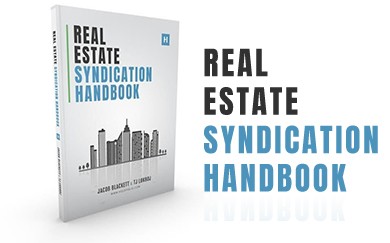Syndicating a real estate deal is among the most lucrative investment opportunities for those with the grit and determination to execute it.
But as any successful syndicator will warn: it’s not a game for the faint-hearted.
Syndication demands skills, knowledge, and the ability to strategically adapt in the face of unforeseen circumstances that impact the syndicate both internally and externally.
That said, it can come with many rewards for those prepared to rise to the challenge. First-hand experience gained is invaluable to those considering a future in syndication. Many real estate entrepreneurs have transitioned from other career paths to build flourishing real estate syndication businesses from the ground up.
We’ve outlined the real estate syndication phases to help get you familiar with the process.
Table of Contents
Syndication for Passive Income
There are two sides to the coin of passive cash flow when we’re talking about syndication.
Passive investors are only required to provide upfront capital for the purchase and operation of the desired real estate asset. They then gain a return in continuous cash distributions and build equity in the property over the investment term.
In many cases, passive investors are called on to guide the sponsor by contributing relevant knowledge and experience to the team.
This process is easy provided the sponsor is well educated and proactive. Partnering with an inexperienced sponsor can lead to bumps in the road for passive investors who have not developed a deep personal and professional trust with the syndicate.
Real estate syndications are appealing to sponsors seeking high returns with little capital to invest.
That said, there’s very little that’s passive about syndicating a real estate deal in the beginning. The sponsor’s position comes hand in hand with all active duties of the deal, including soliciting the asset, implementing the business plan, managing the property, and executing the exit strategy in due course.

Of course, some of these duties can be outsourced to a third-party property management team. However, the onus of ensuring the deal is seamless and all key players are performing in the team’s best interests balances on the shoulders of the sponsor.
Investing Made Simple
There is a smarter way to invest completely passively in syndication. Holdfolio is a trusted professional crowdfunding real estate syndicator that offers an easy and stable alternative to the unexpected hitches non-professional syndicates may encounter.
By partnering with Holdfolio, investors can enjoy a passive revenue stream without worrying about whether their sponsor has the competency, and without having to do any of the work themselves.
Holdfolio has a vertically integrated property management team to take care of daily operations for investors. They put skin in the game by investing alongside partners, and work hard to ensure everybody receives a high return. Currently, investors enjoy an average of 19% ROI. When investors partner with Holdfolio, everybody wins.
With Holdfolio you can enter real estate deals for as little as $20k, which is significantly lower than the industry standard of $50k. This gives non-accredited investors the same access to lucrative opportunities as pro investors.

Investing with Holdfolio is simple. All you have to do is create an account on the online platform, select your investment asset, then deposit the money. Partners can monitor how their investment is performing from this online channel, making it the easiest and smartest way to attain a residual passive income stream with little effort.
If you prefer a reliable, hassle-free passive income with syndication, partner with Holdfolio today.
On the other hand, if you hunger for an adrenaline kick and prefer the increased control of active participation in a syndicated deal, read on to learn about the phases you can expect to encounter.
Origination
The origination phase of syndication is where the sponsor undertakes heavy due diligence duties to prepare for all aspects of the project. By breaking down each stage of the syndication, planning and research becomes a more logical process.
This phase entails planning, marketing the deal, satisfying registration and disclosure obligations, and acquiring the property. Let’s break them down into individual sections:
Planning
Planning a syndicate is the most critical part of the process! During the planning phase, start by immersing yourself in the local market where you plan to invest.
Call upon networks in the real estate industry to find viable property options that can cater to the flexibility of your syndicate team.
To select the right asset, sponsors may wish to consider the following:
- Lot size: land is a finite commodity and tends to gain higher appreciation than a building or structure.
- Local development plans can positively or negatively affect the resale value of your asset when it comes time to exit the investment.
- Physical inspection of the property to gain a first-hand appreciation of the investment potential.
- Cost-segregation analyses will give you a better idea of depreciation and tax advantages to inform your approach
The key here is to do thorough due diligence on the property.
Research and planning help the sponsor devise a strong business case to attract passive real estate investors to enter the project.
All information gathered will inform contingency planning to ensure smooth running through the operational phase.
Marketing the deal
Now you know which asset you want to invest in and have a detailed game plan in tow. It’s time to market the deal.
Consult with your personal and professional networks to rally up a group of trustworthy, interested participants that have the capital you need for the deal.
Individuals with specific skill sets and experience to inject into the project are highly desirable. Think lawyers, accountants, property managers, or simply investors who have previously been involved in syndicates.
Find partners you can work productively with through the entire investment term.
When a syndicate has aligned values and objectives, smooth interpersonal relationships and a consolidated strategy ensure that the venture will not only be successful, but enjoyable too.
For instance, imagine one partner’s goals are to earn cash fast by flipping the property, and another prefers to hold an asset and enjoy a long-term passive income stream. You can avoid major complications down the line by confirming everyone is on the same page at the very beginning.
Satisfying Registration and Disclosure Obligations
Because raising funds for a syndicate is considered equivalent to issuing securities, the Securities and Exchange Commission (SEC) Act, 1933, will mandate that you form a syndicate when putting a deal together with passive investors.
This is because you hold a responsibility to partners, who put their trust in you as they would a funds manager in stock trading.
Syndications also require a government-regulated Private Placement Memorandum. This details the set-up of the agreement, and outlines the returns and risk each party can expect.
Enlist a syndication attorney during this step, as it’s the best way to establish the agreement in a legal framework and protect the syndicate from potential problems.
Hire an accountant to audit the financial records of the asset to avoid an undue call from Uncle Sam during the operational phase.
Acquiring the Property
Brush up those negotiation skills! Your partners rely on you to negotiate a good deal with the seller, so clarify where your investor team can be flexible, as well as the non-negotiables.
You’ll be expected to validate the title and solve any impediments to closing the deal, then secure the contract.

First-time buyers are advised to engage a buyer’s agent. Professionals offer their expertise and help remove some of the emotion from the transaction. This is particularly useful when there is more than one person involved in the decision-making.
Next, it’s time to get down to business.
Operation
During the operational phase, sponsors have two key duties: managing the syndicate and managing the property.
You will need to utilise your excellent communication, logistical, and managerial skills to pull off this stage. Let’s take a closer look.
Property Management
The sponsor’s job is to manage the daily operations of the property, according to the strategy your syndicate has chosen.
The scope and nature of work could vary greatly, depending on your asset and strategy.
For example, let’s say the team has chosen to flip an apartment over the short term and capitalize on forced appreciation. You will be responsible for soliciting contracts or consent, overseeing rehab, developments, and construction at the property.
In another instance, if your strategy is to buy and hold an apartment complex for ten years and take advantage of rental income, you will be responsible for property management.
This may involve collecting rent, finding reliable tenants and performing background checks, managing individual leases, building maintenance, and repairs. That’s not to mention tending to the unexpected events that arise with property management.

It is possible to outsource property management responsibilities to a professional company if you’re prepared to relinquish a cut of your investment returns.
In this case, the sponsor needs to “manage the manager” to ensure their decision-making is in the best interests of the syndicate.
Syndicate Relationships
It’s necessary to hold regular meetings with limited partners to update them on business operations and keep everyone informed.
Parties can meet on a monthly or quarterly basis to learn how the asset is performing. If your strategy is working well, your partners will be reassured.
However if the strategy is not functioning to plan, or if you identify certain opportunities for the syndicate that may require a recalibration of direction, use these gatherings to communicate openly with partners.
This is an opportunity to collectively devise a strategic way forward, and ensure that everybody is on the same page. Syndicate meetings are the best place to ask questions.
Don’t worry if your investors are not located in the same place – with modern technology it’s easy to host online meetings.
You may also wish to conduct an annual report to keep partners informed about the business’s performance.
The operational stage is where sponsors do the most work in a syndicate. If this sounds a bit much, and you prefer a passive role in syndication, partner with Holdfolio. Our property management team takes charge of running your assets, and you can easily access your investment performance any time from the online portal.
Liquidation and Completion
The liquidation phase entails a “liquidation event” whereupon capital is returned to investors, or the sydicate may also choose to refinance.
In the event of liquidation by selling the asset, the sponsor must undertake a series of critical tasks.
First, the property is prepared for sale by making necessary renovations to increase its appeal to buyers. Enlist the help of a broker to market the asset to prospective buyers in the commercial real estate market.

The sponsor then facilitates a tour of the premises to any interested prospects, reviews the offers, then negotiates a good selling price for the asset with the winning buyer.
Passive investors are paid their shares from the investment. Lastly, the sponsor prepares the final tax returns for the investment.
In the case of refinancing, you need to find a good lender and negotiate the refinancing of the property. This involves closing on the loan and distributing new loan proceeds to partners.
If refinancing is a viable option, the operational phase will run until the final liquidation of the asset.
Summary
Syndicating a real estate deal is a big task, but it’s made much more approachable by distilling it down to the three fundamental phases: origination, operation, and liquidation.
Sponsors generally thrive off chasing down a great deal and working closely with teams to make the venture successful. However, if you’re looking for a less active role in your real estate investment, Holdfolio is there to take the weight of active investment off your shoulders. Partner with Holdfolio to enjoy a hassle-free passive income stream today.
 Back to Blog
Back to Blog




